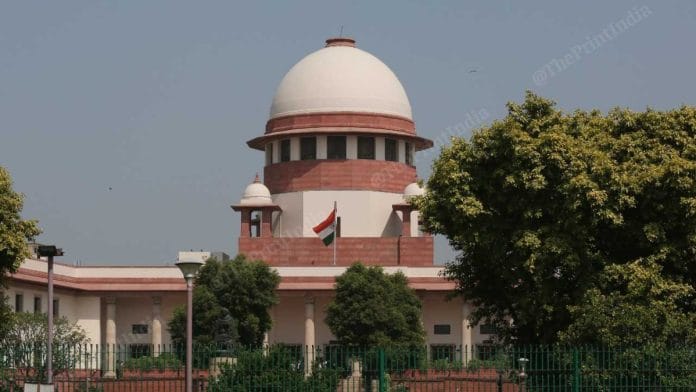New Delhi: In a significant decision Thursday, the Supreme Court ordered high courts to recommend appointment of retired judges on an ad-hoc basis to clear the backlog of pending criminal appeals. Such appointments would be irrespective of vacancies in a specific court, the top court said.
A three-judge special bench, led by Chief Justice of India Sanjiv Khanna, issued the direction, supplementing the Supreme Court’s 2021 judgment that had mooted the idea of ad-hoc judges under Article 224A of the Constitution. The direction comes in the backdrop of the burgeoning pendency of criminal appeals and a large number of vacancies in high courts that are working with only 60 percent strength.
Criminal appeals are petitions filed by convicts challenging the lower court’s findings against them. These appeals are heard by a two-judges bench.
Article 224A empowers the chief justice of a high court, with the President’s previous consent, to ask any retired judge of the same or any other high court to sit and act as a judge. Ad-hoc judges are entitled to allowances as determined by the President’s order and have the jurisdiction, powers and privileges of a judge of that high court.
The 2021 judgment delivered by a bench of then Chief Justice S.A. Bobde had issued directions for the appointment of ad-hoc judges. However, the bench had stipulated a condition, saying such appointments should not be made unless 80 percent of the sanctioned strength was already recommended or working. There was also a warning against routinely resorting to appointing judges on an ad-hoc basis, instead of making regular appointments.
Another trigger point in the 2021 order included situations where cases in a particular category were pending for five or more years, or when more than 10 percent of the backlog was pending for five years, or if the rate of institution of new cases was more than the disposal rate.
On Thursday, the top court relaxed all conditions laid down in the 2021 judgment. “Each high court shall appoint ad-hoc judges by taking recourse to Article 224A,” the bench said, highlighting the high number of criminal appeals pending in them. It pointed out the number of pending cases in high courts had increased–among the more than 62 lakh cases pending, more than 18 lakh were criminal and 44 lakh civil cases.
The bench also said the ad-hoc judges could be appointed as “puisne” judges on the two-judges bench, with the serving judge heading it. The clarification was important since the retired judge, who would be appointed as an ad-hoc, would be senior in age and experience to the serving one who would lead the bench. The bench, however, imposed a restriction on the number of ad-hoc judges that can be appointed in a high court. It said that the appointment should be between two to five judges and not exceed 10 percent of the sanctioned strength.
The appointment of an ad-hoc judge would be based on the procedure outlined in Memorandum of Procedure (MoP), which is the rulebook on appointments to high courts and the top court. After the chief justice of the high court forwards the details and names of the retired judge to the chief minister, the latter will pass on this recommendation to the Union law minister, who after the CJI’s advice, shall forward it to the Prime Minister. The PM will advise the President on whether an approval should be given.
The 2021 judgment had, however, held that the recommendation should be routed through the top court collegium and not the CJI. It had also said that Article 224A can be “resorted to only on the process having been initiated for filling up of the regular vacancies and awaiting their appointments”. The provision was described as dormant, considering only three appointments were made in 2021 under it.
(Edited by Tikli Basu)
Also read: As SC Collegium considers proposal to tackle nepotism, how the bar views the possible move






